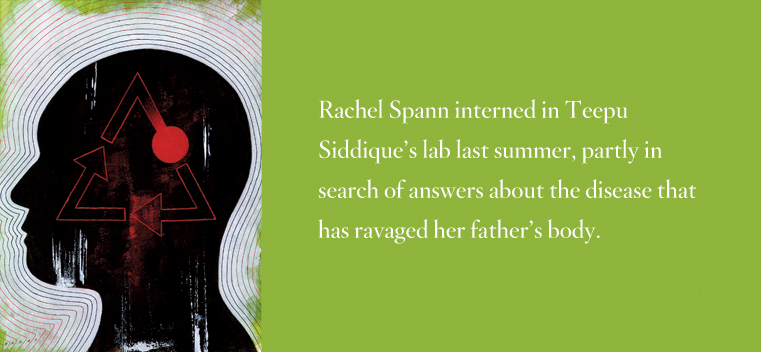
A Family Fight Against ALS
Find Us on Social Media
Northwestern professor Teepu Siddique and his research made a monumental ALS discovery — a finding that perhaps meant most to lab tech Rachel Spann.
Northwestern professor Teepu Siddique has been studying the underlying mechanisms of amyotrophic lateral sclerosis for more than a quarter century. His research team’s monumental discovery of a common cause for all types of ALS was particularly meaningful to one of the technicians in his lab, Rachel Spann.
Rachel interned in Siddique’s lab last summer, partly in search of answers about the disease that has ravaged her father’s body.
Timothy Spann, a researcher and adjunct assistant professor in cell and molecular biology at the Feinberg School of Medicine, was diagnosed with ALS, or Lou Gehrig’s disease, in fall 2008 while working as a patent attorney at a Chicago law firm. ALS, a fatal neurodegenerative disease that paralyzes its victims, affects an estimated 350,000 people worldwide, and about 50 percent of them die within three years of its onset.
Timothy, who had worked at the medical school for a decade before leaving to earn a law degree in the mid-2000s, knew of Siddique’s research through the Les Turner ALS Foundation, which has supported the Spann family since his diagnosis and also partners with the medical school to advance ALS research. Siddique, the Les Turner ALS Foundation/Herbert C. Wenske Professor in Feinberg’s Davee Department of Neurology and Clinical Neurosciences, welcomed the Spann family to his lab last spring. The visit piqued Rachel's curiosity about ALS research.
“At first I didn’t really want to know much about the disease because I was so devastated by the diagnosis,” says Rachel, a junior who is premed with a cognitive science major. “But dealing with my father’s condition every day, I became interested in the science and biology behind ALS.”
Rachel, who grew up on Chicago’s South Side, originally attended Washington University but took a year off to spend time with her family and help with her father’s care and then transferred to Northwestern to be closer to home.
Volunteering in Siddique’s lab gave Rachel her first exposure to neuroscience. She helped a researcher section spinal cords from mice, stain them for various antibodies and check for protein aggregates that are common to ALS. She attended staff meetings, where she presented on her own lab work as well as the latest research findings.
“I was the only student there who had a family member affected by ALS,” she says. “That allowed me to approach ALS research from a unique perspective.”
The underlying disease process of ALS has long been a mystery, preventing development of effective therapies. Until Siddique’s discovery, scientists weren’t even sure all its forms actually converged into a common disease process.
The basis of the disorder is a broken-down protein recycling system in the neurons of the spinal cord and the brain. Optimal functioning of the neurons relies on efficient recycling of the protein building blocks in the cells. In ALS, that recycling system is broken. The cell can’t repair or maintain itself and becomes severely damaged.
“This discovery opens up a whole new field for finding an effective treatment for ALS,” says Siddique. “We can now test for drugs that would regulate this protein pathway or optimize it, so it functions as it should in a normal state.”
The breakdown in protein recycling occurs in all three forms of ALS: hereditary, which is called familial; ALS that is not hereditary, called sporadic; and ALS that targets the brain, ALS/dementia.
Timothy was diagnosed with bulbar onset sporadic ALS, one of its most aggressive forms. In most cases ALS attacks the large muscle groups first, with a slow progression to fine motor skills, until the person becomes paralyzed and can no longer move, speak, swallow or breathe.
But in his case, Timothy first lost the ability to speak and swallow. The progression has gone in reverse. He’s still able to communicate, thanks to computer devices provided in part by the Les Turner ALS Foundation that allow him to speak and email.
“His personality, who he is, is still there,” Rachel says.
And he’s her biggest supporter as she embarks on her own journey in medical research. “It’s one of those things that keeps him going, helping me with my premed classes, helping me with my research, giving me encouragement.
“I grew up in my dad’s lab,” she adds, “so I’m really comfortable in a research environment. But before all this I had always viewed research as something my dad did, and I would go into medicine like my mother [Ananya], who is a pediatrician. This diagnosis has brought me closer to my dad and closer to research. I don’t see it as just something my dad does. It’s something I want to be a part of, too.”



 Facebook
Facebook Twitter
Twitter Email
Email


